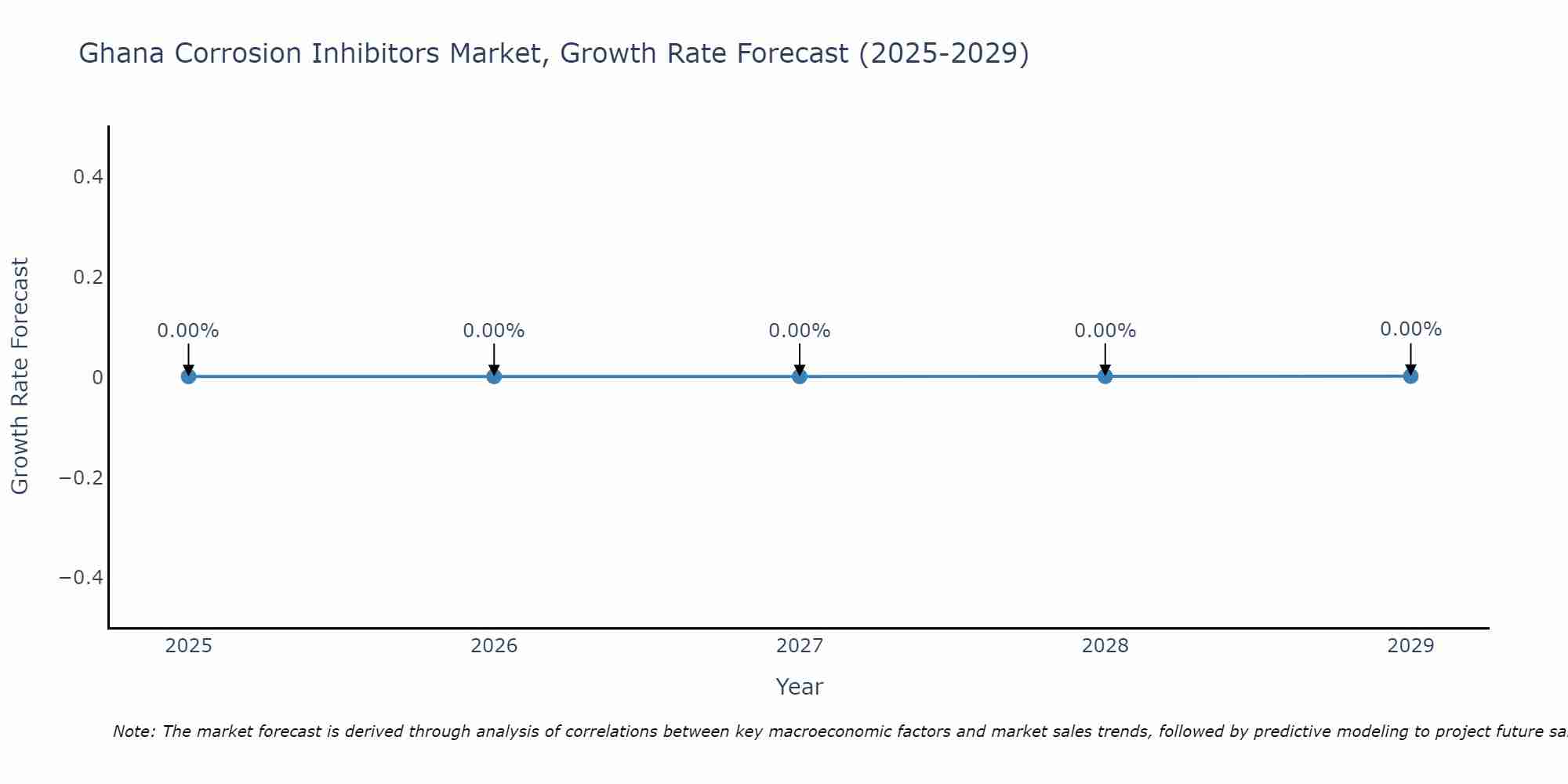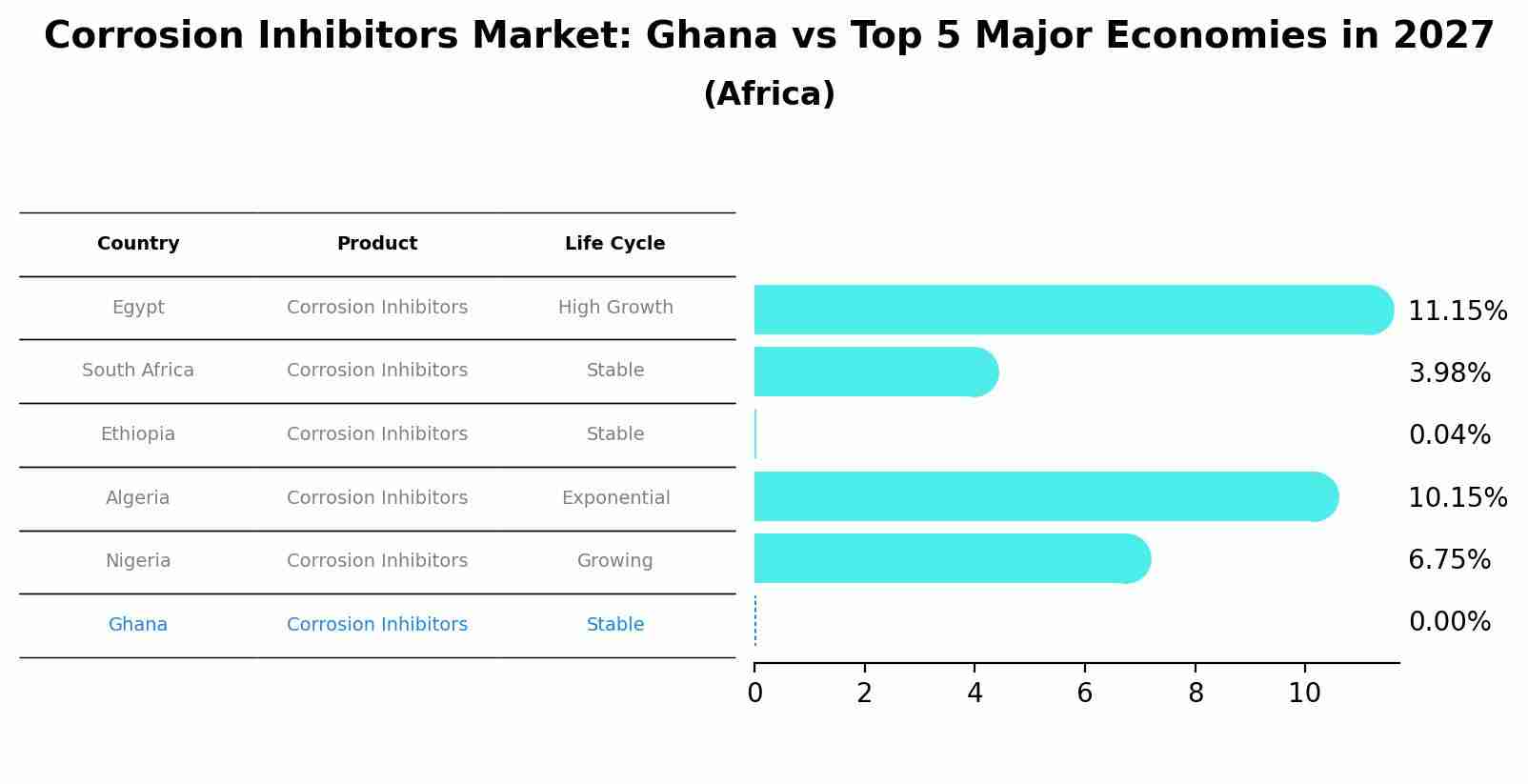Ghana Corrosion Inhibitors Market (2025-2031) Outlook | Growth, Analysis, Share, Value, Forecast, Industry, Revenue, Size, Companies & Trends
| Product Code: ETC130594 | Publication Date: Jun 2021 | Updated Date: Apr 2025 | Product Type: Report | |
| Publisher: 6Wresearch | Author: Ravi Bhandari | No. of Pages: 70 | No. of Figures: 35 | No. of Tables: 5 |
Ghana Corrosion Inhibitors Market Size Growth Rate
The Ghana Corrosion Inhibitors Market is poised for steady growth rate improvements from 2025 to 2029. Commencing at 0.00% in 2025, growth builds up to 0.00% by 2029.

Corrosion Inhibitors Market: Ghana vs Top 5 Major Economies in 2027 (Africa)
Ghana's Corrosion Inhibitors market is anticipated to experience a stable growth rate of 0.00% by 2027, reflecting trends observed in the largest economy Egypt, followed by South Africa, Ethiopia, Algeria and Nigeria.

Ghana Corrosion Inhibitors Market Overview
Corrosion inhibitors are chemical compounds used to protect metal surfaces from corrosion and degradation in various environments. In Ghana, the corrosion inhibitors market serves industries such as oil and gas, marine, manufacturing, and infrastructure. With the prevalence of corrosive conditions in industrial processes and equipment, the demand for corrosion inhibitors is significant in Ghana. Suppliers and manufacturers in Ghana offer a wide range of corrosion inhibitor products tailored to specific applications and environmental conditions, helping businesses prolong the service life and reliability of their assets and infrastructure.
Drivers of the market
The expansion of industries such as oil and gas, petrochemicals, and manufacturing in Ghana is driving the demand for corrosion inhibitors. Corrosion inhibitors protect metal surfaces from degradation and corrosion caused by chemical reactions and environmental factors, driving their essential role in infrastructure maintenance and asset protection.
Challenges of the market
In the corrosion inhibitors market in Ghana, challenges arise from limited awareness about corrosion prevention technologies and maintenance practices. Additionally, environmental regulations and safety standards may impact the selection and usage of corrosion inhibitors in industrial and infrastructure projects.
Government Policy of the market
In support of the corrosion inhibitors market, the government may implement policies aimed at promoting infrastructure development, industrial growth, and environmental protection. These policies could include initiatives to incentivize the use of corrosion inhibitors in construction materials, transportation infrastructure, and industrial equipment to extend service life, reduce maintenance costs, and mitigate environmental impacts. Additionally, the government may prioritize efforts to regulate the use and disposal of corrosion inhibitors to minimize adverse effects on human health and the environment, promote research and development in corrosion prevention technologies, and facilitate collaboration between public and private stakeholders to address emerging challenges and opportunities in corrosion management across various sectors of the economy.
Key Highlights of the Report:
- Ghana Corrosion Inhibitors Market Outlook
- Market Size of Ghana Corrosion Inhibitors Market, 2024
- Forecast of Ghana Corrosion Inhibitors Market, 2031
- Historical Data and Forecast of Ghana Corrosion Inhibitors Revenues & Volume for the Period 2021-2031
- Ghana Corrosion Inhibitors Market Trend Evolution
- Ghana Corrosion Inhibitors Market Drivers and Challenges
- Ghana Corrosion Inhibitors Price Trends
- Ghana Corrosion Inhibitors Porter's Five Forces
- Ghana Corrosion Inhibitors Industry Life Cycle
- Historical Data and Forecast of Ghana Corrosion Inhibitors Market Revenues & Volume By Product for the Period 2021-2031
- Historical Data and Forecast of Ghana Corrosion Inhibitors Market Revenues & Volume By Organic for the Period 2021-2031
- Historical Data and Forecast of Ghana Corrosion Inhibitors Market Revenues & Volume By Inorganic for the Period 2021-2031
- Historical Data and Forecast of Ghana Corrosion Inhibitors Market Revenues & Volume By Type for the Period 2021-2031
- Historical Data and Forecast of Ghana Corrosion Inhibitors Market Revenues & Volume By Water Based for the Period 2021-2031
- Historical Data and Forecast of Ghana Corrosion Inhibitors Market Revenues & Volume By Oil Based for the Period 2021-2031
- Historical Data and Forecast of Ghana Corrosion Inhibitors Market Revenues & Volume By End-use for the Period 2021-2031
- Historical Data and Forecast of Ghana Corrosion Inhibitors Market Revenues & Volume By Power Generation for the Period 2021-2031
- Historical Data and Forecast of Ghana Corrosion Inhibitors Market Revenues & Volume By Oil & Gas for the Period 2021-2031
- Historical Data and Forecast of Ghana Corrosion Inhibitors Market Revenues & Volume By Paper & Pulp for the Period 2021-2031
- Historical Data and Forecast of Ghana Corrosion Inhibitors Market Revenues & Volume By Metal Processing for the Period 2021-2031
- Historical Data and Forecast of Ghana Corrosion Inhibitors Market Revenues & Volume By Chemical Processing for the Period 2021-2031
- Historical Data and Forecast of Ghana Corrosion Inhibitors Market Revenues & Volume By Water Treatment for the Period 2021-2031
- Historical Data and Forecast of Ghana Corrosion Inhibitors Market Revenues & Volume By Others for the Period 2021-2031
- Ghana Corrosion Inhibitors Import Export Trade Statistics
- Market Opportunity Assessment By Product
- Market Opportunity Assessment By Type
- Market Opportunity Assessment By End-use
- Ghana Corrosion Inhibitors Top Companies Market Share
- Ghana Corrosion Inhibitors Competitive Benchmarking By Technical and Operational Parameters
- Ghana Corrosion Inhibitors Company Profiles
- Ghana Corrosion Inhibitors Key Strategic Recommendations
Frequently Asked Questions About the Market Study (FAQs):
Ghana Corrosion Inhibitors |
1 Executive Summary |
2 Introduction |
2.1 Key Highlights of the Report |
2.2 Report Description |
2.3 Market Scope & Segmentation |
2.4 Research Methodology |
2.5 Assumptions |
3 Ghana Corrosion Inhibitors Market Overview |
3.1 Ghana Country Macro Economic Indicators |
3.2 Ghana Corrosion Inhibitors Market Revenues & Volume, 2021 & 2031F |
3.3 Ghana Corrosion Inhibitors Market - Industry Life Cycle |
3.4 Ghana Corrosion Inhibitors Market - Porter's Five Forces |
3.5 Ghana Corrosion Inhibitors Market Revenues & Volume Share, By Form, 2021 & 2031F |
3.6 Ghana Corrosion Inhibitors Market Revenues & Volume Share, By Type, 2021 & 2031F |
3.7 Ghana Corrosion Inhibitors Market Revenues & Volume Share, By End-use, 2021 & 2031F |
4 Ghana Corrosion Inhibitors Market Dynamics |
4.1 Impact Analysis |
4.2 Market Drivers |
4.3 Market Restraints |
5 Ghana Corrosion Inhibitors Market Trends |
6 Ghana Corrosion Inhibitors Market, By Types |
6.1 Ghana Corrosion Inhibitors Market, By Product |
6.1.1 Overview and Analysis |
6.1.2 Ghana Corrosion Inhibitors Market Revenues & Volume, By Product, 2021-2031F |
6.1.3 Ghana Corrosion Inhibitors Market Revenues & Volume, By Organic, 2021-2031F |
6.1.4 Ghana Corrosion Inhibitors Market Revenues & Volume, By Inorganic, 2021-2031F |
6.2 Ghana Corrosion Inhibitors Market, By Type |
6.2.1 Overview and Analysis |
6.2.2 Ghana Corrosion Inhibitors Market Revenues & Volume, By Water Based, 2021-2031F |
6.2.3 Ghana Corrosion Inhibitors Market Revenues & Volume, By Oil Based, 2021-2031F |
6.3 Ghana Corrosion Inhibitors Market, By End-use |
6.3.1 Overview and Analysis |
6.3.2 Ghana Corrosion Inhibitors Market Revenues & Volume, By Power Generation, 2021-2031F |
6.3.3 Ghana Corrosion Inhibitors Market Revenues & Volume, By Oil & Gas, 2021-2031F |
6.3.4 Ghana Corrosion Inhibitors Market Revenues & Volume, By Paper & Pulp, 2021-2031F |
6.3.5 Ghana Corrosion Inhibitors Market Revenues & Volume, By Metal Processing, 2021-2031F |
6.3.6 Ghana Corrosion Inhibitors Market Revenues & Volume, By Chemical Processing, 2021-2031F |
6.3.7 Ghana Corrosion Inhibitors Market Revenues & Volume, By Water Treatment, 2021-2031F |
7 Ghana Corrosion Inhibitors Market Import-Export Trade Statistics |
7.1 Ghana Corrosion Inhibitors Market Export to Major Countries |
7.2 Ghana Corrosion Inhibitors Market Imports from Major Countries |
8 Ghana Corrosion Inhibitors Market Key Performance Indicators |
9 Ghana Corrosion Inhibitors Market - Opportunity Assessment |
9.1 Ghana Corrosion Inhibitors Market Opportunity Assessment, By Product, 2021 & 2031F |
9.2 Ghana Corrosion Inhibitors Market Opportunity Assessment, By Type, 2021 & 2031F |
9.3 Ghana Corrosion Inhibitors Market Opportunity Assessment, By End-use, 2021 & 2031F |
10 Ghana Corrosion Inhibitors Market - Competitive Landscape |
10.1 Ghana Corrosion Inhibitors Market Revenue Share, By Companies, 2024 |
10.2 Ghana Corrosion Inhibitors Market Competitive Benchmarking, By Operating and Technical Parameters |
11 Company Profiles |
12 Recommendations |
13 Disclaimer |
- Single User License$ 1,995
- Department License$ 2,400
- Site License$ 3,120
- Global License$ 3,795
Search
Thought Leadership and Analyst Meet
Our Clients
Related Reports
- Afghanistan Apparel Market (2026-2032) | Growth, Outlook, Industry, Segmentation, Forecast, Size, Companies, Trends, Value, Share, Analysis & Revenue
- Canada Oil and Gas Market (2026-2032) | Share, Segmentation, Value, Industry, Trends, Forecast, Analysis, Size & Revenue, Growth, Competitive Landscape, Outlook, Companies
- Germany Breakfast Food Market (2026-2032) | Industry, Share, Growth, Size, Companies, Value, Analysis, Revenue, Trends, Forecast & Outlook
- Australia Briquette Market (2025-2031) | Growth, Size, Revenue, Forecast, Analysis, Trends, Value, Share, Industry & Companies
- Vietnam System Integrator Market (2025-2031) | Size, Companies, Analysis, Industry, Value, Forecast, Growth, Trends, Revenue & Share
- ASEAN and Thailand Brain Health Supplements Market (2025-2031) | Strategy, Consumer Insights, Analysis, Investment Trends, Opportunities, Growth, Size, Share, Industry, Revenue, Segments, Value, Segmentation, Supply, Forecast, Restraints, Outlook, Competition, Drivers, Trends, Demand, Pricing Analysis, Competitive, Strategic Insights, Companies, Challenges
- ASEAN Bearings Market (2025-2031) | Strategy, Consumer Insights, Analysis, Investment Trends, Opportunities, Growth, Size, Share, Industry, Revenue, Segments, Value, Segmentation, Supply, Forecast, Restraints, Outlook, Competition, Drivers, Trends, Demand, Pricing Analysis, Competitive, Strategic Insights, Companies, Challenges
- Europe Flooring Market (2025-2031) | Outlook, Share, Industry, Trends, Forecast, Companies, Revenue, Size, Analysis, Growth & Value
- Saudi Arabia Manlift Market (2025-2031) | Outlook, Size, Growth, Trends, Companies, Industry, Revenue, Value, Share, Forecast & Analysis
- Uganda Excavator, Crane, and Wheel Loaders Market (2025-2031) | Strategy, Consumer Insights, Analysis, Investment Trends, Opportunities, Growth, Size, Share, Industry, Revenue, Segments, Value, Segmentation, Supply, Forecast, Restraints, Outlook, Competition, Drivers, Trends, Demand, Pricing Analysis, Competitive, Strategic Insights, Companies, Challenges
Industry Events and Analyst Meet
Whitepaper
- Middle East & Africa Commercial Security Market Click here to view more.
- Middle East & Africa Fire Safety Systems & Equipment Market Click here to view more.
- GCC Drone Market Click here to view more.
- Middle East Lighting Fixture Market Click here to view more.
- GCC Physical & Perimeter Security Market Click here to view more.
6WResearch In News
- Doha a strategic location for EV manufacturing hub: IPA Qatar
- Demand for luxury TVs surging in the GCC, says Samsung
- Empowering Growth: The Thriving Journey of Bangladesh’s Cable Industry
- Demand for luxury TVs surging in the GCC, says Samsung
- Video call with a traditional healer? Once unthinkable, it’s now common in South Africa
- Intelligent Buildings To Smooth GCC’s Path To Net Zero


















